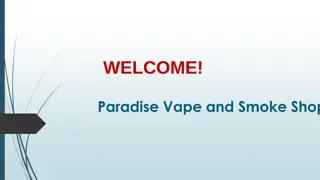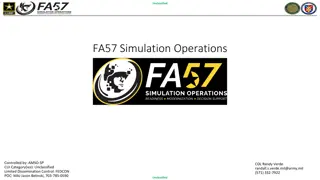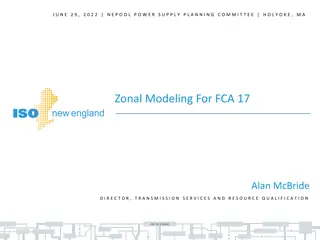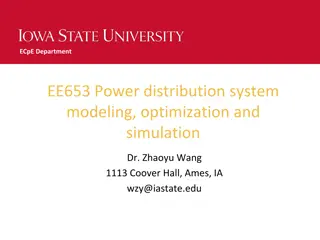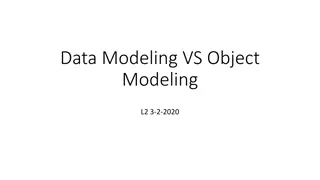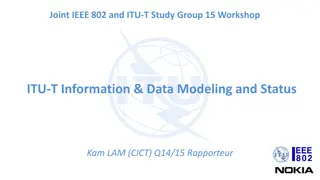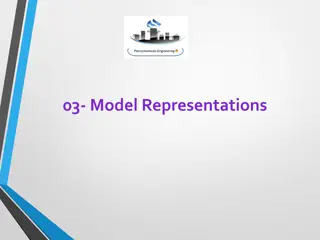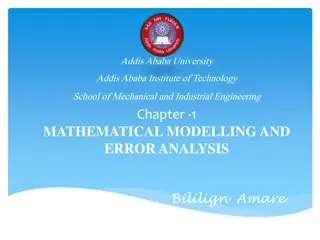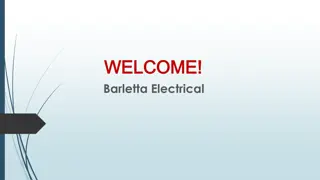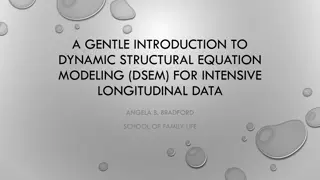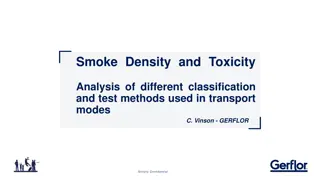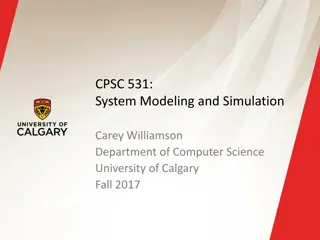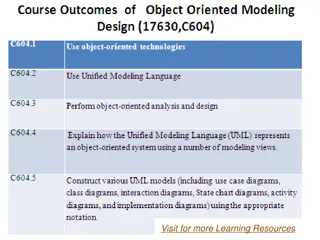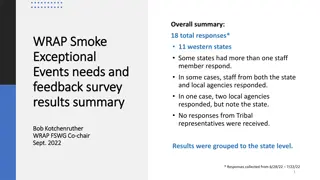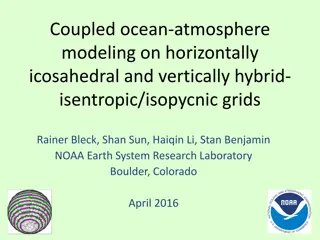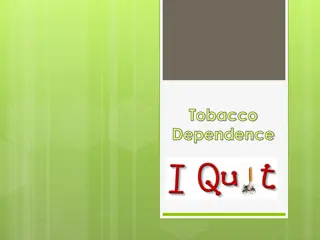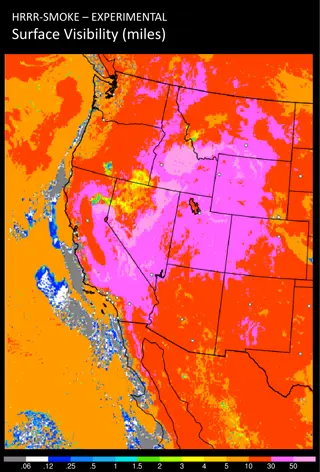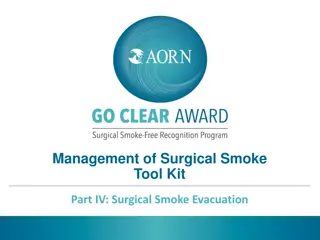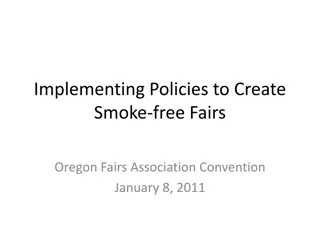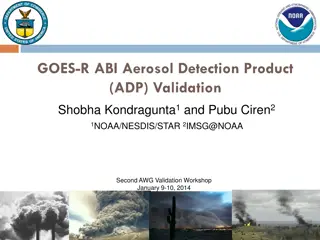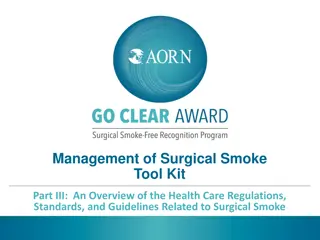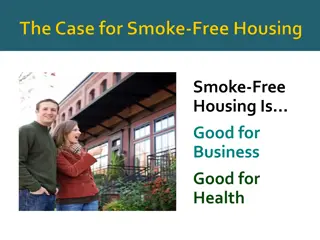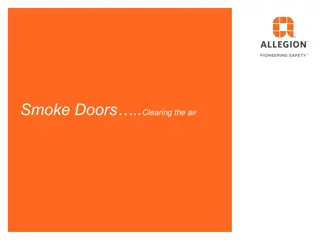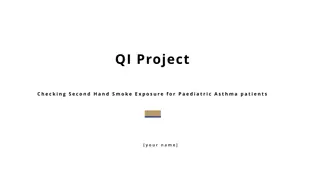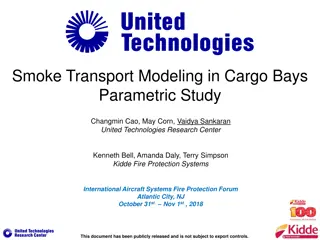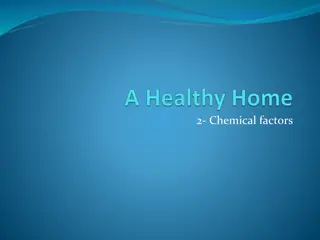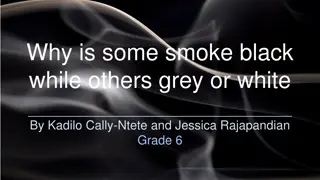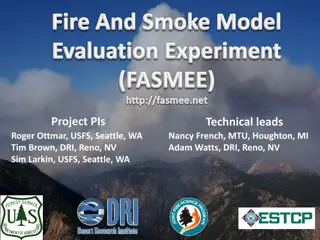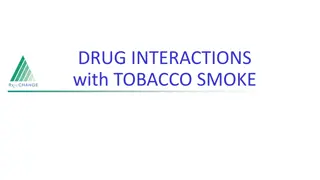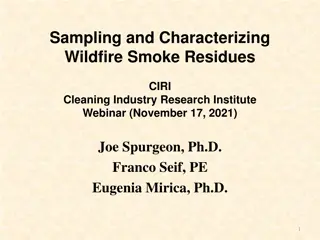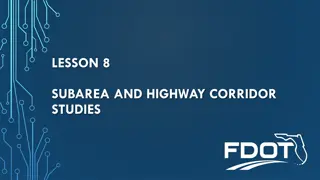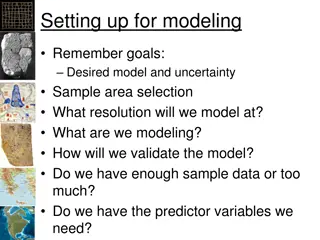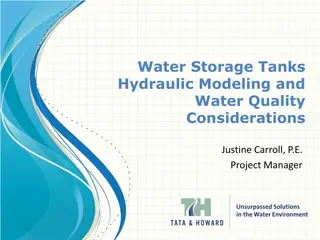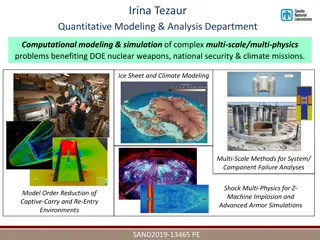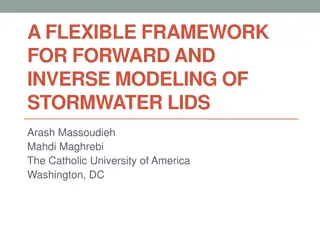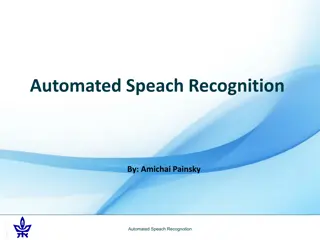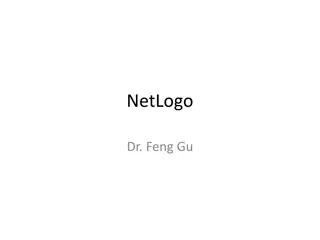About Fire and Smoke Damage Restoration Services
Fire and smoke damage cleanup is an arduous process that often requires the proper industrial equipment Work with MSI today for professiona services. \/\/ \/services\/fire-smoke-damage
8 views • 16 slides
Best Smoke shop in Metro Park
If you\u2019re looking for a Smoke shop in Metro Park, Then contact Paradise Vape and Smoke Shop. They aim to provide great service being that they are a family-owned small business. Call them anytime if you have any questions in regards to their products and the industry. You can rest assured that
0 views • 6 slides
Overview of Army Modeling and Simulation Office
The U.S. Army Modeling and Simulation Office (AMSO) serves as the lead activity in developing strategy and policy for the Army Modeling and Simulation Enterprise. It focuses on effective governance, resource management, coordination across various community areas, and training the Army Analysis, Mod
2 views • 8 slides
Capacity Zone Modeling for Forward Capacity Auction 17 Results
This presentation unveils the Capacity Zone modeling calculations for Forward Capacity Auction 17 associated with the 2026-2027 Capacity Commitment Period by ISO-NE PUBLIC. It delves into boundary definitions, import-constrained zone modeling, and market rules guiding the assessments and modeling pr
1 views • 16 slides
Distribution Feeder Modeling and Analysis Overview
This document delves into the modeling, optimization, and simulation of power distribution systems, specifically focusing on Distribution Feeder Modeling and Analysis. It covers the components of a typical distribution feeder, series components, Wye-Connected Voltage Regulator modeling, and equation
1 views • 14 slides
Understanding Data Modeling vs Object Modeling
Data modeling involves exploring data-oriented structures, identifying entity types, and assigning attributes similar to class modeling in object-oriented development. Object models should not be solely based on existing data schemas due to impedance mismatches between object and relational paradigm
0 views • 17 slides
Evolution of Modeling Methodologies in Telecommunication Standards
Workshop on joint efforts between IEEE 802 and ITU-T Study Group 15 focused on information modeling, data modeling, and system control in the realm of transport systems and equipment. The mandate covers technology architecture, function management, and modeling methodologies like UML to YANG generat
1 views • 16 slides
Understanding Geometric Modeling in CAD
Geometric modeling in computer-aided design (CAD) is crucially done in three key ways: wireframe modeling, surface modeling, and solid modeling. Wireframe modeling represents objects by their edges, whereas surface modeling uses surfaces, vertices, and edges to construct components like a box. Each
1 views • 37 slides
Mathematical Modeling and Error Analysis in Engineering
Mathematical modeling plays a crucial role in solving engineering problems efficiently. Numerical methods are powerful tools essential for problem-solving and learning. This chapter explores the importance of studying numerical methods, the concept of mathematical modeling, and the evaluation proces
0 views • 10 slides
Best Smoke Alarms in Carrington
If you want the Best Smoke Alarms in Carrington, visit Barletta Electrical. They specialize in providing top-quality electrical services for residential and commercial properties. Whether you need installations, repairs, smoke alarms, or domestic mai
1 views • 6 slides
Introduction to Dynamic Structural Equation Modeling for Intensive Longitudinal Data
Dynamic Structural Equation Modeling (DSEM) is a powerful analytical tool used to analyze intensive longitudinal data, combining multilevel modeling, time series modeling, structural equation modeling, and time-varying effects modeling. By modeling correlations and changes over time at both individu
0 views • 22 slides
Analysis of Smoke Density and Toxicity in Various Transport Modes
This document presents an in-depth analysis of smoke density and toxicity in different transport modes, including maritime, railway, and aircraft. It covers classification documents, testing methods, hazard levels, and measured parameters for evaluating smoke density and toxicity levels. The synthes
0 views • 6 slides
System Modeling and Simulation Overview
This content provides insights into CPSC 531: System Modeling and Simulation course, covering topics such as performance evaluation, simulation modeling, and terminology in system modeling. It emphasizes the importance of developing simulation programs, advantages of simulation, and key concepts lik
1 views • 28 slides
Understanding Object Modeling in Software Development
Object modeling is a crucial concept in software development, capturing the static structure of a system by depicting objects, their relationships, attributes, and operations. This modeling method aids in demonstrating systems to stakeholders and promotes a deeper understanding of real-world entitie
1 views • 65 slides
Wildfire Smoke Exceptional Events Survey Summary
Survey results indicate that staff across various organizations in 11 Western states possess the expertise to develop wildfire smoke exceptional events demonstrations for particulate matter and ozone. The majority of states express readiness to assist other organizations and seek training to enhance
0 views • 17 slides
Coupled Ocean-Atmosphere Modeling on Icosahedral Grids
Coupled ocean-atmosphere modeling on horizontally icosahedral and vertically hybrid-isentropic/isopycnic grids is a cutting-edge approach to modeling climate variability. The design goals aim to achieve a global domain with no grid mismatch at the ocean-atmosphere interface, with key indicators such
2 views • 21 slides
Understanding the Impact of Secondhand Smoke on Infants with Cystic Fibrosis
Studying infants with cystic fibrosis exposed to secondhand smoke revealed that those in smoke-free homes experienced better growth and lower risk of bacterial infections compared to those with smoking parents. Creating a quit plan for smokers is essential to improve health outcomes and prevent rela
2 views • 25 slides
HRRR Experimental Smoke Data Analysis
This content showcases experimental data from HRRR-SMOKE, focusing on surface visibility in miles and vertically integrated smoke levels in mg/m2. The images provide insights into the spatial distribution of smoke and visibility conditions, potentially useful for monitoring air quality and assessing
0 views • 4 slides
Comprehensive Guide to Surgical Smoke Evacuation in the Perioperative Setting
This detailed guide covers the essential aspects of surgical smoke evacuation in the perioperative setting. It includes information on smoke evacuator systems, evaluating smoke evacuators, critical features to consider, smoke capture methods, triple filter system, and the use of wall suction with in
0 views • 20 slides
Implementing Smoke-free Policies at Fairs: A Comprehensive Guide
Explore the step-by-step process of developing, implementing, and enforcing smoke-free policies at fairs. Learn from the experiences of other fairs, understand the importance of no smoking policies for health and the environment, and gain insights into addressing challenges and building partnerships
0 views • 25 slides
GOES-R ABI Aerosol Detection Product Validation Summary
The GOES-R ABI Aerosol Detection Product (ADP) Validation was conducted by Shobha Kondragunta and Pubu Ciren at the NOAA/NESDIS/STAR workshop in January 2014. The validation process involved testing and validating the ADP product using proxy data at various resolutions for detecting smoke, dust, and
1 views • 21 slides
Overview of Health Care Regulations and Standards for Surgical Smoke Management
This part of the surgical smoke management toolkit provides an overview of the health care regulations, standards, and guidelines related to surgical smoke. It covers various organizations such as AORN, ANSI, ECRI, IFPN, The Joint Commission, CDC, NIOSH, and OSHA, emphasizing the importance of contr
0 views • 17 slides
Benefits of Smoke-Free Housing in Colorado
Smoke-free housing in Colorado offers numerous advantages, including improving business outcomes, reducing health risks, lowering maintenance costs, and enhancing property values. By implementing smoke-free policies, property owners can protect residents' health, reduce fire risks, minimize cleaning
0 views • 30 slides
Understanding Smoke Doors and Clearing the Air in Building Regulations
Smoke doors can be confusing due to varying conditions, requirements, misinterpretations, and differentiating them from fire doors. This guide provides insights on classifying smoke doors, relevant documents, and tips for clarification.
1 views • 10 slides
Improving Pediatric Asthma Care Through Second-Hand Smoke Exposure Assessment
Data from GP practices in Wales indicate a low rate of discussing second-hand smoke exposure with pediatric asthma patients. This Quality Improvement (QI) project aims to ensure systematic identification and advice provision for patients exposed to second-hand smoke during asthma reviews. The propos
0 views • 6 slides
Parametric Study on Smoke Transport Modeling in Cargo Bays
Explore the parametric study conducted by researchers on smoke transport modeling in cargo bays. The study focuses on developing a model-based tool for designing cargo bay detection systems to streamline the certification process. Key components and motivations for characterizing smoke generators ar
0 views • 12 slides
Chemical Factors: Carbon Monoxide Poisoning and Smoking Risks
Chemical factors such as carbon monoxide poisoning from indoor sources like tobacco smoking and poorly ventilated appliances can lead to serious health risks. Recognizing the signs of CO poisoning, understanding the dangers of cigarette smoke, and addressing the addictive nature of smoking are cruci
0 views • 17 slides
Understanding the Differences in Smoke Colors - Exploring the Science behind Black, Grey, and White Smoke
Smoke color can vary based on what is being burned, the level of combustion, and various other factors. Black smoke often indicates incomplete combustion of heavy materials, while grey smoke signals the fire settling down. White smoke is common at the start of a fire or with lighter fuels. By studyi
1 views • 11 slides
Fire and Smoke Modeling Evaluation Effort (FASMEE) Overview
FASMEE is a collaborative project aimed at assessing and advancing fire and smoke modeling systems through critical measurement techniques and observational data. Led by key technical leads, FASMEE focuses on diverse modeling areas such as fire growth, effects, coupled fire-atmosphere behavior, smok
5 views • 30 slides
Interactions of Tobacco Smoke with Medications: Effects and Recommendations
Drug interactions with tobacco smoke can impact the pharmacokinetics and pharmacodynamics of various medications. Tobacco smoke constituents can induce enzymes that affect the metabolism of drugs, leading to altered therapeutic responses. For example, CYP1A2 enzyme induction by tobacco smoke can dec
0 views • 6 slides
Comparison of Wet-Wipe and Tape Lift Methods for Sampling Wildfire Smoke Residues
This research study compared the performance of wet-wipe and tape lift sampling methods for evaluating the impact of surface char from wildfire smoke residues. The study involved sampling 48 houses in Southern California affected by different wildfires, utilizing side-by-side replicate samples colle
0 views • 56 slides
Subarea and Highway Corridor Studies: Travel Demand Modeling and Refinements
In this lesson, we delve into subarea and corridor studies focusing on travel demand model refinements, highway network coding, corridor congestion relief, and trip assignment theory. Subarea modeling plays a crucial role in forecasting travel within smaller regions with detailed traffic patterns, t
1 views • 45 slides
Essential Steps for Setting up a Modeling Study
Ensure clarity on modeling goals and uncertainties. Select sample areas strategically based on interest and available data. Determine appropriate resolution for modeling. Define variables to model and validate the model effectively. Assess sample data adequacy and predictor variables availability. E
0 views • 9 slides
Water Storage Tanks Hydraulic Modeling and Water Quality Considerations
This presentation by Justine Carroll, P.E., Project Manager, focuses on the hydraulic modeling and water quality considerations related to water storage tanks. It covers topics such as water age evaluation, steady state modeling, extended period simulations, pump controls, demand patterns, EPS verif
0 views • 34 slides
Advancing Computational Modeling for National Security and Climate Missions
Irina Tezaur leads the Quantitative Modeling & Analysis Department, focusing on computational modeling and simulation of complex multi-scale, multi-physics problems. Her work benefits DOE nuclear weapons, national security, and climate missions. By employing innovative techniques like model order re
0 views • 6 slides
Flexible Framework for Stormwater Lids Modeling
A new flexible framework for forward and inverse modeling of stormwater lids is presented. It includes governing equations, hydraulic and contaminant transport, numerical methods, and demonstration cases for various green infrastructure components. The importance of different processes in modeling i
0 views • 20 slides
Understanding Automated Speech Recognition Technologies
Explore the world of Automated Speech Recognition (ASR), including setup, basics, observations, preprocessing, language modeling, acoustic modeling, and Hidden Markov Models. Learn about the process of converting speech signals into transcriptions, the importance of language modeling in ASR accuracy
0 views • 28 slides
Environmental Work Group Updates - August 2021 Progress
Fire & Smoke, Oil & Gas, RTO, and WESTAR/WRAP work groups provided updates on their progress in various areas such as stakeholder workshops, data resource updates, modeling research, and ongoing meetings. The updates include discussions on wildfire smoke issues in tribal communities, refining work g
0 views • 5 slides
NetLogo - Programmable Modeling Environment for Simulating Natural and Social Phenomena
NetLogo is a powerful and versatile programmable modeling environment created by Uri Wilensky in 1999. It allows users to simulate natural and social phenomena by giving instructions to multiple agents operating independently, making it ideal for modeling complex systems evolving over time. NetLogo
0 views • 7 slides
Constructing a Vortex Ring Cannon for Shooting Smoke Rings
Learn how to construct a vortex ring cannon that shoots smoke rings with sufficient distance to target the chairperson of your Science Fight. Materials required include a flowerpot, rubber bands, stretchable fabric, rope, drill, and jigsaw, along with substances like dry ice and water. Follow the st
0 views • 8 slides

